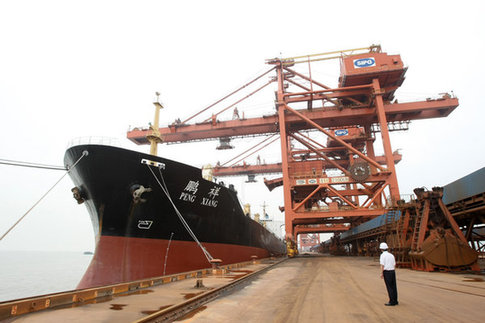
Talks between China's steel industry and international iron ore suppliers to settle the final price of ore for the 2009-10 contract year were still ongoing, the China Iron and Steel Association (CISA) said, even as it admitted that some steel mills had agreed to a 33-percent cut from last year's price.
A negotiator from CISA said the price agreed to by Chinese mills was not final, the Caijing financial magazine reported.
This year's negotiations have become particularly uncertain following this week's detention of four employees of Rio Tinto, which has triggered a sweeping revamp of the iron ore import business.
An executive at Hebei Iron and Steel Group said the firm had agreed to a 33-percent cut from last year's benchmark rate with Australian miners Rio Tinto and BHP Billiton, and a 28-percent discount from last year's rate with Brazil's Vale SA, in line with settlements reached by Japanese and South Korean mills, Dow Jones reported earlier.
CISA rejected a 33-percent cut agreed to by Rio Tinto and Japanese and South Korean mills in May, and held out for a 40-percent cut.
Cui Jingyi, a steel analyst from Guotai Junan Securities, said this year's negotiation price was unlikely to be affected by the Rio scandal since there was huge demand for iron ore in China.
"If you look at the steel output this year, you will find the Chinese steel industry still maintaining a sustainable growth rate," she said.
China's crude steel output in June touched 45.39 million tons, the official Shanghai Securities News reported yesterday.
Daily production in June was 1.51 million tons, and the rate of output was equivalent to an annual production of 552.2 million tons, up 10 percent from 2008.
"CISA asked for a 40-percent discount on iron ore prices at the beginning of this year due to the economic slump," said Fan Haibo, a senior steel analyst from Xinda Securities. "But they over-evaluated the situation. The global steel industry might reduce output this year, but China's steel industry, which now accounts for half of global iron ore consumption, is still robust."
"I don't think they can wait for a better price," he said.